War of Deities: The Rise of Darkness in Westeros
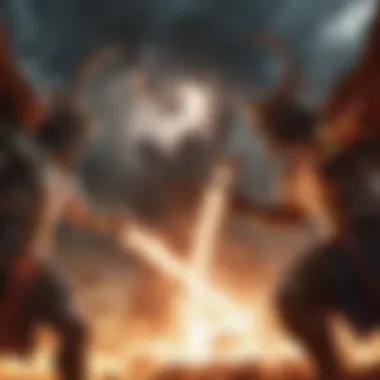
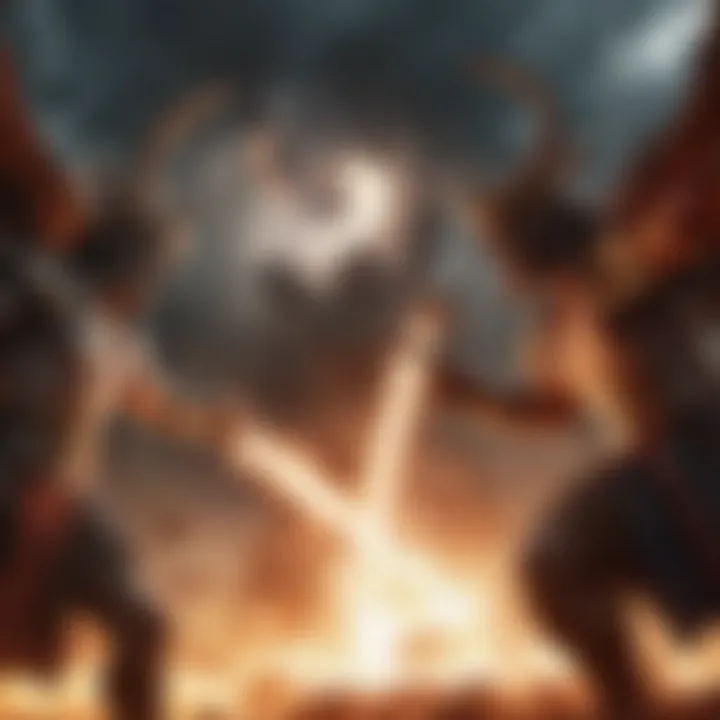
Intro
The realms of Westeros and Essos are not solely defined by their mortal inhabitants. A complex tapestry of divine influence weaves through the narrative of the Game of Thrones universe. Deities and their enigmatic powers play a pivotal role in shaping the destinies of both the living and the dead. This influence often oscillates between benevolence and malevolence, particularly as the theme of darkness rises. The intrigue lies in how these celestial conflicts manifest in human actions, altering the balance of power in subtle yet significant ways.
This article intends to dismantle this intricate relationship between deities and mortals, providing an in-depth exploration of character motivations, significant episodes, and the rich lore that underpins the series. Throughout our journey, we will uncover the ramifications of divine interventions, assess their chaotic outcomes, and prompt a dialogue on the implications of such interactions.
Character Dissections
Understanding key characters in the Game of Thrones series is vital for grasping the overarching narrative. Characters not only face personal challenges but also embody the struggles between divine forces.
Detailed analysis of key characters
The impact of the gods is evident in characters such as Melisandre, Thoros of Myr, and the Children of the Forest.
- Melisandre is a prominent figure, whose devotion to the Lord of Light influences many key events. Her belief in prophecy drives her actions, culminating in critical moments such as the resurrection of Jon Snow.
- Thoros of Myr, similarly, exemplifies the complexities of faith and resurrection. His connection to the Lord of Light underlines the unpredictability of divine influence.
- The Children of the Forest are steeped in lore, representing ancient powers that interfere in mortal affairs to maintain balance against encroaching darkness.
Character development throughout the series
Each character experiences a profound evolution, reflecting how divine influences guide their paths. For example, Melisandre’s journey from a confident adviser to a more conflicted figure illustrates the capricious nature of faith.
Impact on the overarching storyline
These characters not only serve as conduits of divine influence but are also stewards of chaos. Their decisions ripple through the narrative, affecting alliances and enmities, steering the fate of Westeros toward destruction or salvation.
Episode Breakdowns
The series unfolds through various episodes, each serving as a significant chapter in the cosmic struggle.
Recap of significant events in each episode
Key episodes reflect the theme of rising darkness, often through divine interventions that culminate in pivotal moments. For instance, "The Battle of the Bastards" showcases the clashing realities of mortal ambition and divine arbiters, where outcomes hinge on personal choices interwoven with celestial fate.
Exploration of themes and symbolism
Darkness and light play crucial roles across episodes. The stark contrast often symbolizes the larger cosmic conflict, presenting a narrative with intrinsic tension between hope and despair.
Key moments and their implications
Several key moments serve as turning points in the series. For example, Daenerys' rising connection to her dragons not only symbolizes her ascension as a leader but also draws attention to the supernatural elements influencing her destiny.
Lore Explorations
Delving into the history of Westeros reveals layers of myth and cultural narratives underscoring the series' events.
Rich history and lore of Westeros
Westeros is steeped in lore involving ancient deities, their roles in shaping history, and the ongoing war between light and darkness. Learning about the Faith of the Seven, the Old Gods, and the Lord of Light helps to contextualize the actions of characters.
Uncovering hidden details and connections
Hidden details often connect characters to these deities, adding depth to their motives and choices. For instance, Bran Stark’s evolving connection to the Three-Eyed Raven reinforces the significance of prophecy and foreknowledge in facing darkness.
Cultural and mythical aspects of the world
Exploring the cultural aspects, such as the rituals of the faiths, helps to ground the narrative in a believable reality where divine conflict impacts even the smallest decisions.
Fan Theories
The Game of Thrones community has birthed a myriad of fan theories that speculate on the influence of deities in shaping plot developments.
Compilation of popular and intriguing fan theories
From theories about the Night King as a pawn of ancient powers to speculations about Jon Snow's true lineage, fans engage in deep analysis, reflecting their investment in the story.
Evaluation of theories based on evidence from the show
Evaluating these theories often involves cross-referencing events with hints dropped throughout the series. The interplay of light and darkness offers rich terrain for this explorative exercise.
Speculation on future plot developments
As the series has concluded, discussions continue among fans about what could have transpired, suggesting an ongoing legacy of divine conflict echoing through the ages of Westeros.
Thus, the narrative of rising darkness amidst the gods and mortals fuels not only the series' core conflicts but also the engagement and fascination of its audience.
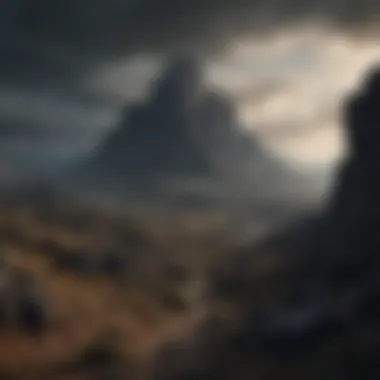
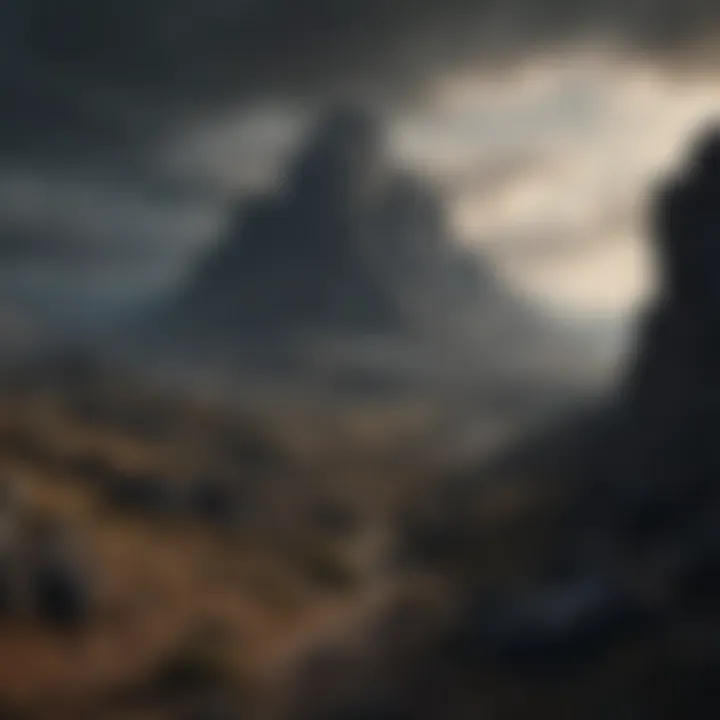
Preamble to the War of Deities
The theme of divine conflict in the Game of Thrones universe offers a unique exploration of morality, power, and human nature. It reveals how these celestial beings impact the lives of mortals. In this section, we will introduce some key elements relevant to understanding the War of Deities. The focus will be on the nature of deities, the thematic significance of darkness, and the interplay between divine motives and human actions.
Defining Deities in the Game of Thrones Universe
In the world of Game of Thrones, deities are more than mere figments of imagination; they embody the deep-seated beliefs and fears of the characters. Various gods exist in this narrative, from the Old Gods, revered in the North, to the Seven, worshipped in the South. Each group of believers holds their own interpretation of divine will, which shapes their actions and narratives.
The Old Gods are associated with nature, and their presence is felt through the weirwoods. They resonate with old magic and timeless wisdom, suggesting a sense of ancient continuity. In contrast, the Seven represent organized religion, with an established hierarchy of worship and rituals. They influence political dynamics due to their significant following.
Many characters are seen to invoke these deities, whether for protection, guidance, or gaining favor. This leads to an exploration of how faith impacts decisions, actions, and ultimately, the wider war among these deities and their followers.
Overview of Darkness as a Thematic Element
Darkness is a recurring motif throughout the series. It symbolizes chaos, fear, and the unknown. As we study the rise of darkness, it's essential to understand what it represents in this context. It often leads to despair or conflict, as seen with the Night King and his army of the undead. This embodiment of darkness serves as a force against which many characters must battle.
In addition, darkness can manifest in the moral choices characters face. Choices driven by ambition or revenge often lead individuals to darker paths, further enriching the theme. The conflict between light and dark becomes a direct reflection of the struggles faced by the characters.
By examining both deities and darkness, we can see how these elements intertwine and shape the narrative in this universe. The nuances of divine influence create layers of meaning that enhance character development and plot progression, making it a vital aspect of the overall analysis.
The Rise of Darkness: Historical Context
Understanding the rise of darkness within the context of the Game of Thrones universe requires a thorough examination of its historical backdrop. Conflicts among deities throughout time have laid the groundwork for current tensions. These metaphysical battles not only shape the divine realm but also extend their influence into the lives of mortals. By analyzing prior conflicts, one can grasp the patterns of behavior that lead to the resurgence of darkness.
Previous Conflicts Among Deities
The history of divine conflicts is rich and complex. Various pantheons have faced upheavals that echo through time. For instance, the Old Gods of the Forest clashed with the First Men as territories collided and ideologies clashed. Similarly, the rise of the Seven brought a new system of worship that disrupted the existing religious order. In these moments, deities acted not only as divine entities but also as influencers of human fate.
These conflicts often lead to shifts in power dynamics, with certain deities gaining prominence while others fade into obscurity. Such transitions have contributed to the cyclical nature of divine influence, where darkness can gain the upper hand at any moment. This oscillation sets the stage for future confrontations, reinforcing the idea that the rise of darkness is an ongoing struggle rather than a singular event.
Influence of Historical Events on Current Tensions
Historical events play a significant role in shaping the tensions among deities and their followers. For example, the War of the Five Kings altered allegiances and birthed new conflicts. As the power vacuum emerged, both divine and mortal entities sought to fill it. The Night King, an embodiment of darkness, used this turmoil to reassert his influence over the realm. His actions were not isolated but rather deeply intertwined with the chaos that marked this period.
Furthermore, the lessons learned from past confrontations have impacted how deities approach their interactions with mortals. They have become cautious yet tantalizingly manipulative. By utilizing the memories of previous conflicts, they attempt to predict behaviors and navigate the fragile balance of power.
"History does not repeat itself, but it often rhymes." This adage rings true within the divine machinations of the Game of Thrones universe. Dark themes arise again and again, signaling a perpetual cycle of conflict.
In summary, the rise of darkness is not a standalone phenomenon but is deeply rooted in historical conflicts and their enduring influence. These narratives allow for a deeper understanding of character motivations and the chaotic interplay between divine and mortal realms. This interconnectivity emphasizes the importance of examining the historical context, revealing how past actions shape present realities.
Key Deities in the Narrative
In the complex tapestry of the Game of Thrones universe, key deities play a pivotal role in shaping events, influencing characters, and determining the fate of the realm. The interactions among these divine entities create a dynamic landscape where power, belief, and morality intertwine. Understanding the significance of these figures offers insights into both the overarching narrative and the personal journeys of key characters. This investigation illuminates how the deities not only reflect the desires and fears of their followers but also instigate changes that echo throughout history and into the mortal world.
The Old Gods: Guardians or Manipulators?
The Old Gods represent an ancient and mystical force in the Game of Thrones universe. Revered primarily by the Free Folk, their worship is deeply rooted in nature and the old ways. Trees, specifically weirwood trees, serve as their physical manifestations. While many regard the Old Gods as benevolent guardians of the land, there exists a duality in their nature that cannot be ignored. Are they truly the protectors they appear to be, or do they manipulate events to serve their inscrutable purposes?
The actions of the Old Gods are often subtle, operating through dreams and visions to influence key decision-makers. For instance, characters such as Bran Stark experience prophetic dreams linked to the will of the Old Gods. This ability to direct mortal lives raises questions about the autonomy of individuals who seem to be acting on their own volition. Furthermore, their ambiguous morality invites debate on whether their interventions truly serve the greater good or simply perpetuate cycles of violence and conflict.
The Seven: Divinity and Political Power
The Seven represent a more formalized pantheon in the Game of Thrones universe. This group of deities embodies various aspects of life, such as war, love, and death. Their influence extends beyond spirituality into the realm of politics, as many noble houses invoke their blessings for legitimacy and power. The worship of the Seven, especially in regions like the South, creates a structured religious doctrine that intertwines with governance.
However, the use of religion as a political tool complicates the nature of their divinity. For example, the Faith Militant is mobilized in the name of the Seven, often utilizing violent means to enforce religious doctrines. As characters like Cersei Lannister seek the favor of the Seven for political maneuvering, the line between faith and power becomes blurred. The Seven, thus, serve as both a religious and a political force within the narrative, illustrating how divine influence can be co-opted for personal gain.
The Night King: Embodiment of Darkness
The Night King stands as one of the most menacing figures within the pantheon of deities in the Game of Thrones universe. As the embodiment of darkness, he represents death and the desire to extinguish life across Westeros. His creation of the White Walkers to serve as his army signifies a direct challenge to the existing order of life and belief. Unlike other deities, the Night King's intentions are overtly destructive, posing an existential threat that transcends mortal conflicts.
The Night King's story arc raises profound questions about the nature of evil and resistance. As he advances towards the living, characters must confront their own beliefs to unite against a common adversary. His presence serves as a stark reminder of the fragility of life in the face of darkness and forces both mortals and deities to reassess their role in the ongoing conflict. Ultimately, the Night King embodies the culmination of fears and the somber truth that darkness will always attempt to reclaim its dominion.
Impact of Deity Conflicts on Mortal Realms
The intersection of divine influence and mortal actions creates an intricate web of conflicts and resolutions that define the structure of relationships in the Game of Thrones universe. As deities clash, the ramifications extend beyond celestial spheres. The mortal realm feels the weight of these divine movements through shifts in power dynamics, religious fervor, and widespread chaos. These conflicts manifest not merely in stories of heroes or villains but in the everyday lives of the characters that inhabit this world.
The ongoing battle between deities serves to highlight the fragility of power. Mortals find themselves tossed around like pawns on a grand chessboard, their choices and destinies manipulated by powers above them. This interplay paints a vivid picture of how divine conflicts reshape the societal landscape, often leading to catastrophic events that redefine the understanding of loyalty, power, and faith.
Shifts in Power Dynamics
When deities engage in conflict, the most immediate effect is a shift in power dynamics among mortals. For instance, the resurrection of the Night King incites fear and rallying among the living, shifting alliances and reconfiguring power structures. Traditional houses display vulnerability as old gods and new threaten their very existence.
- Targaryens and Dragons: Daenerys Targaryen wields her dragons as symbols of divine favor, creating a narrative where her lineage dictates the rise and fall of houses.
- Faith Militant: The Faith of the Seven also tries to exert its influence. Their actions in the mortal realm serve to underline the house's dependance on divine approval.
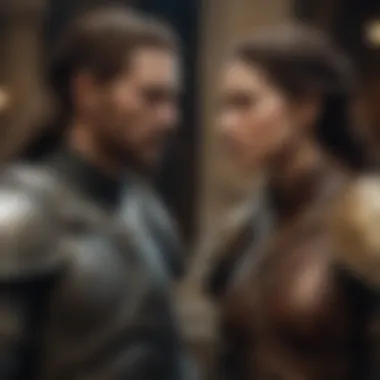
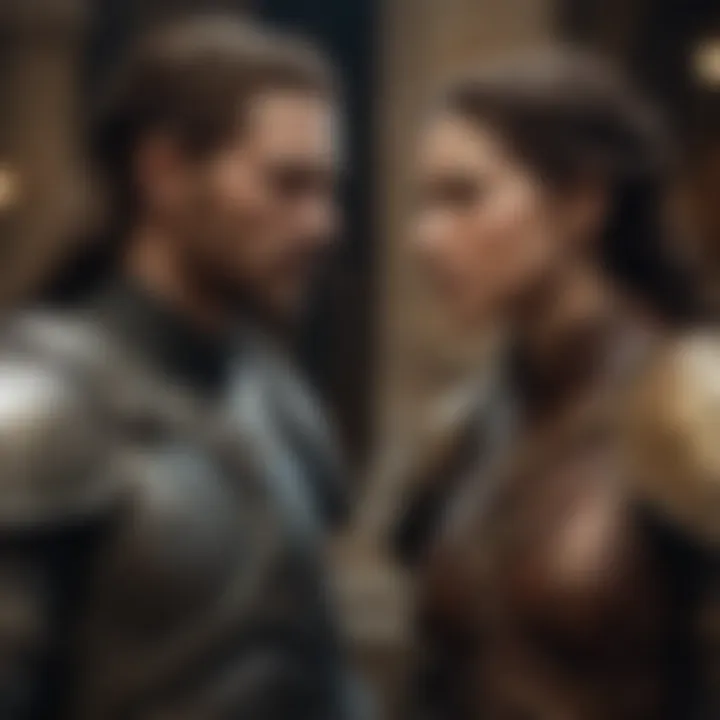
Such transformative events create a ripple effect through regions, illustrating how inseparably linked the fates of mortals are to celestial squabbles. New alliances emerge while old bonds fracture, forcing mortal beings to navigate through a landscape increasingly marked by uncertainty and strife.
Reflections of Divine Will in Human Conflicts
The divine will can often reflect itself in human conflicts, guiding their actions and decisions. Characters influenced by divine machinations may act in accordance with prophetic visions or signs, leading to tragic complexities in relationships. This idea illustrates how faith can shape behavior, prompting mortals to undertake actions in line with their interpretation of divine purpose.
"Many beings believe they act under their own volition, but how often do they dance to the rhythm of a greater power?"
- Jon Snow: He embodies the struggle between destiny and choice, acting in accordance with what many perceive to be divine destiny.
- Melisandre: She interprets signs for her own interests, often skewing the idea of free will for those around her.
Thus, the implications of deity conflicts stretch across the mortal realm. Understanding how these divine influences alter interpersonal relationships grants a nuanced view of motivations within the narrative. One must consider the extent to which human conflicts are mere reflections of celestial dramas. Ultimately, the interplay between divine entities and human affairs creates a complex landscape that challenges both belief and reality.
Character Case Studies: When Mortals Meet the Divine
The exploration of mortal interactions with divine beings is critical in understanding the narrative depth of the Game of Thrones universe. These character case studies reveal not just individual arcs but also the larger themes of fate, prophecy, and the battle between light and darkness. By analyzing these characters, we understand how their relationships with deities shape the events around them, influencing choices of power and morality.
When mortals encounter divine forces, it raises questions about free will and predestination. Characters like Jon Snow, Daenerys Targaryen, and Melisandre each have unique interactions with the divine, illustrating the complex push and pull of divine intervention. These encounters lead to significant transformation, often acting as turning points in their personal journeys.
Understanding these dynamics offers benefits such as:
- Insight into character motivations
- A deeper appreciation of themes intertwined with the narrative
- An analysis of how divine conflicts manifest in human realms
This framework establishes a lens through which the War of Deities is both personal and grand, influencing not only individual destinies but the state of the world itself.
Jon Snow: A Chosen Warrior
Jon Snow serves as a focal point for the relationship between mortals and the divine. As the illegitimate son of Ned Stark, Jon’s journey is marked by a search for identity and purpose. His apparent connection to the divine is highlighted when he is resurrected by Melisandre. Amidst the chaos of the Night King’s threat, Jon emerges as a pivotal figure who embodies hope and resilience.
His actions often resonate with the notions of duty and sacrifice, reflecting a deeper connection to the Old Gods. Furthermore, Jon's decisions influence not just his fate but also the fate of Westeros. This brings to light the significant role of prophecy and how it can dictate actions, sometimes against personal desires.
"The night is dark and full of terrors"
This quote from Melisandre signifies the looming threat of darkness, which Jon must contend with. His character arc embodies the themes of heroism and the burdens that come with destiny, making him a representative of the struggles between light and dark.
Daenerys Targaryen: Breaker of Chains
Daenerys Targaryen is another integral character who illustrates the complex relationship with the divine. Her claim to power is often seen as divine right, fueled by her Targaryen lineage. Daenerys's journey from a pawn in her brother's game to a powerful leader represents her desire to rewrite the rules of power through strength. Her identity as the Mother of Dragons intertwines her fate with that of divinity.
As Daenerys conquers cities and liberates slaves, her actions can appear both noble and tyrannical. Her belief in her destiny can sometimes clash with the consequences of her decision, raising questions of ethics in service to a higher cause. Ultimately, her arc explores how the influence of deities shapes one’s mission, often leading to an intoxicating thirst for power.
Melisandre: The Shadowbinder's Influence
Melisandre, known as the Red Woman, serves as a fascinating study in the interplay of faith and power. She embodies the darker aspects of worship, constantly relying on the will of the Lord of Light. Through ritual and prophecy, she influences significant characters like Stannis Baratheon and Jon Snow. Her character highlights the relevance of sacrifice and fidelity to the divine.
Melisandre's belief in her visions often puts her at odds with the realities on the ground. Her insistence on following prophetic visions can lead to grave consequences, not just for herself but for others around her. Moreover, her frequent use of shadow magic raises ethical dilemmas surrounding the true nature of worship.
In examining Melisandre, we see how devotion can be both a source of strength and a perilous trap. Characters influenced by her actions are often caught in a web of expectations, inevitably making her a crucial catalyst in the ongoing War of Deities.
As we analyze these figures, we gain a multifaceted understanding of the implications of divine influence on mortal affairs, revealing crucial insights into morality, power dynamics, and the nature of self-determination in the face of divine manipulation.
The Role of Prophecy and Fate
The intertwining of prophecy and fate within the realm of Game of Thrones is significant. It serves as a lens through which characters perceive their own journeys and the looming chaos that surrounds them. Prophecies often provide glimpses of potential futures, shaping the motives and actions of key figures within the narrative. For the audience, these elements enrich the mythology of the series, as they ponder whether the characters are mere actors in a preordained drama or if free will allows for deviation from such predictions.
Within our exploration of the War of Deities, understanding prophecy highlights the struggle between divine intent and human agency. Characters are frequently confronted with prophecies that bear weighty expectations. Failure to decipher their meanings can lead to disastrous results. Thus, the tension between interpreting these messages and acting upon them creates a dynamic of uncertainty.
Consequently, various interpretations of prophecy impact the decisions made by significant characters. The imbalance between prophecy and fate creates a compelling narrative tension that resonates throughout the series. Characters grapple with these notions, sometimes obsessively, as seen in the choices they make, revealing their inner struggles and motivations.
Interpreting Signs and Omens
The act of interpreting signs and omens is a recurrent theme seen across multiple story arcs in Game of Thrones. Prophecies, visions, and various signs convey deep meanings that often guide or mislead characters. Based on their perspective, individuals may derive various interpretations that influence their actions significantly.
For example, Melisandre's interpretations shape many pivotal moments in the story. Her belief in Stannis Baratheon as a messianic figure highlights how prophecies can ignite blind faith and drive a character toward their downfall. Additionally, Bran Stark's visions provide insights into the past and future. His ability to witness events and decipher signs illustrates the weighty responsibility tied to prophetic knowledge.
- Types of omens include:
- Dreams or visions
- Natural phenomena (e.g., eclipses, comets)
- Prophetic speeches
These examples illustrate how the narrative complexities arise from each character's unique engagement with the prophetic elements. The ambiguity of signs retains the tension and imbuement of fate throughout the series.
Destiny vs. Free Will in Character Arcs
The conflict between destiny and free will is central to many character arcs in the Game of Thrones universe. As characters face the weight of prophecy, they often wonder if they are guided by fate or exercising genuine choice. This duality leads to both triumphs and tragedies that shape their journeys.
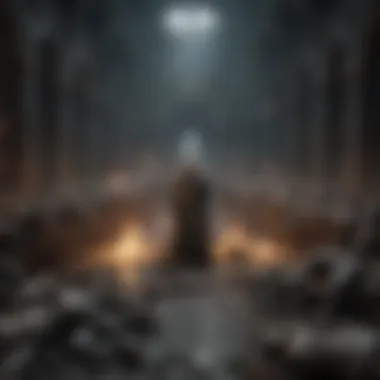
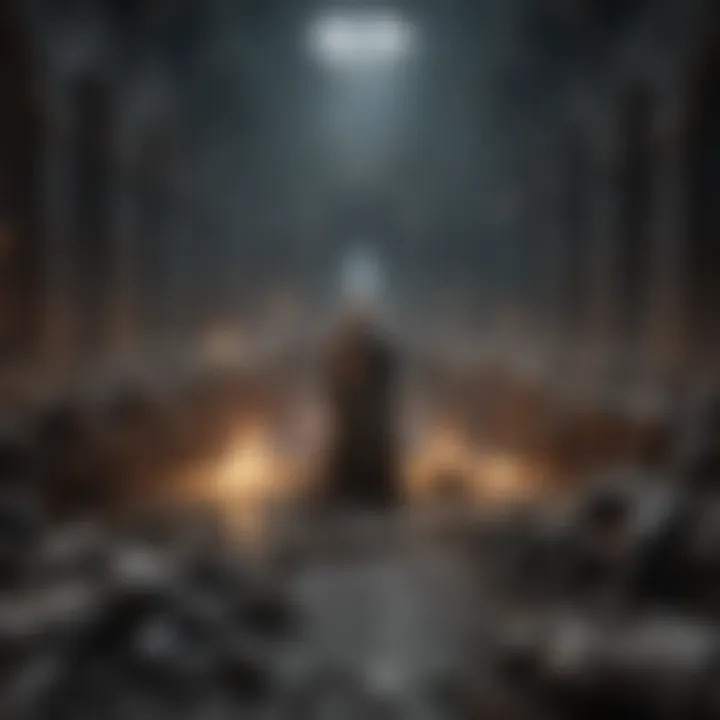
Jon Snow epitomizes this dilemma. The notion of him being a key player in the battle between light and darkness illustrates how prophecy can propel a character into a significant role. However, Jon’s choices, born out of a sense of honor and duty, often reveal a compelling counter-narrative to the deterministic views of fate.
Similarly, Daenerys Targaryen’s path reflects the struggle with realization and ambition. Her quest for the Iron Throne is often framed in the context of being destined to rule. Yet, her decisions ultimately define her trajectory, emphasizing that free will plays a paramount role in shaping outcomes.
"The characters in Game of Thrones live under the weight of prophecy, yet rise against it to assert their own will."
In essence, while destiny shapes the larger backdrop, it is the characters’ free will and moral choices that grant profound depth and impetus to their stories. Their responses to prophetic messages and perceived fate dictate not just their own lives, but the fate of the kingdoms they seek to influence.
The Darker Aspects of Worship
In the vast universe of Game of Thrones, worship takes on complex and often sinister dimensions. The act of worship is not merely about reverence; it can invoke power, elicit fear, and manipulate the fabric of reality itself. This section explores the significance of darker aspects of worship, particularly rituals and sacrifices, as well as the ethics surrounding divine servitude. Understanding these themes is crucial as they shed light on the motivations of characters and the unfolding conflicts in the narrative.
Rituals and Sacrifices
Rituals and sacrifices are paramount in the darker corners of worship within Game of Thrones. These practices are often tied to the deities worshipped by mortals. They serve as expressions of devotion but can also be acts of desperation or political maneuvering. Many adherents believe that such rituals can bring favor from their gods or stave off divine wrath.
In several instances, rituals are depicted as gruesome. For example, followers of the Lord of Light, led by Melisandre, are willing to sacrifice lives to achieve their aims. These blood sacrifices underscore the high stakes involved in seeking divine approbation and illustrate the dire lengths to which individuals will go to secure power for themselves or their people. The rituals connect mortals to the divine but often at a significant cost, highlighting the theme of power learned through bloodshed.
"Through sacrifice, we gain strength. We shape destiny in ways that defy understanding."
- A mantra often echoed among zealous followers.
The impact of these rituals is profound, leading to shifts in political landscapes and personal relationships. Characters involved in these practices often find themselves entwined in moral dilemmas. The use of sacrifices in conflicts, whether as a means to an end or as a desperate measure, raises questions about the nature of faith and the ethics of invoking higher powers to validate one's actions.
The Ethics of Divine Servitude
The ethics surrounding divine servitude are nuanced and often contradictory in Game of Thrones. Characters are frequently faced with difficult choices that test their morals against their devotion to their gods.
Servants of various deities, such as the followers of the Old Gods or the worshipers of the Many-Faced God, embody the conflict between personal ethics and divine commands. For these individuals, the line between right and wrong can become blurred. They often justify their actions, believing they are part of a greater plan.
In contrast, this servitude can become a moral burden. Take, for example, Theon Greyjoy's journey, where his servitude to the Ironborn leads him to compromises with his own sense of self and loyalty. Such complexities reveal the psychological implications of worship that extend beyond mere actions; they affect mental states and character arcs deeply.
The conflict between destiny and free will becomes apparent in these choices of servitude. Characters cannot simply invoke divine will without grappling with their own agency. This struggle illustrates the overarching theme of the series: even under the guidance of gods, mortals remain accountable for their actions.
In summary, the darker aspects of worship in Game of Thrones illuminate the tensions between faith, power, and morality. Rituals and sacrifices, while providing a pathway to divine favor, often lead to chaos and conflict. Similarly, the ethics of divine servitude compel characters to confront their own values, making their stories more compelling and relevant. By examining these elements, one can uncover the intricate ways in which the divine and mortal realms intertwine, shaping destinies and influencing the course of the narrative.
The End: Where Do We Stand?
In wrapping up the discussion on the War of Deities and the rise of darkness, it becomes crucial to highlight several elemental factors that form the core of our analysis. This article addresses both divine and mortal interactions, analyzing their chaotic interdependence. Understanding the culmination of these forces is not just an examination of conflicts among deities but also a reflection on the broader implications for the inhabitants of Westeros.
Future Implications of the War of Deities
The future implications of divine conflicts extend deeply into the trends observed in the Game of Thrones universe. Firstly, the ongoing struggle indicates a possibility of new alliances and tensions emerging among deities. Histories suggest that such conflicts shape mortal destinies, influencing faction powers and the social order of kingdoms. The next narrative arcs could explore new manifestations of darkness through different characters. Perhaps newer figures will arise, embodying the shifting nature of divine influence.
Moreover, we may observe mortals grappling with the consequences of these celestial conflicts. Changes in allegiances may inspire moral dilemmas and redefined aspirations. The weight of divine favor and its eventual withdrawal could reshape how characters approach their quests for power and revenge.
The Enduring Nature of Darkness in the Game of Thrones Narratives
Darkness, as a thematic element, is a persistent and powerful presence throughout the Game of Thrones narratives. Its enduring nature reflects deeper philosophical questions. The entanglement of darkness with divine beings suggests that it will continuously impact the decisions of mortals, creating an ebb and flow between light and dark. This tension not only provides a compelling backdrop but also influences character development and plot evolution over time.
In essence, darkness serves as a mirror, reflecting inherent fears and moral choices faced by the characters. It encapsulates the struggle of maintaining one's humanity in the shadow of larger cosmic forces. As the series unfolds, this element can offer a fertile ground for future storylines, highlighting moral complexities against the backdrop of divine watching.
"The pursuit of power, tempered by the inescapable presence of darkness, remains the ultimate challenge within the game's intricate narratives."
Eventually, these themes lay the groundwork for a richer understanding of the intertwined fates of deities and mortals, ensuring that the legacy of darkness remains a central pillar in the narratives to come.
References and Further Reading
Understanding the complexities of divine conflict and the rise of darkness in the Game of Thrones universe requires more than just passive consumption of the narrative. The section of References and Further Reading is crucial for any reader wishing to delve deeper into these themes. It offers insight into primary texts, analyses, and critical interpretations which enhance comprehension of the intricate relationships within this literary universe.
Exploring references allows fans to connect the fictional elements to historical and mythological contexts. Sources provide clarity on various deities and their motivations, as well as how those influences shape the mortal realm. For instance, reading about real-world mythologies can illuminate the inspirations behind the characters and plots in Game of Thrones.
Moreover, recommended readings go beyond mere plot summaries. They offer interpretations that can shift perspectives on character motivations and narrative developments.
Primary Sources
Primary sources include the original texts that inspired the narrative, as well as the novels themselves by George R. R. Martin. Here are some key elements:
- A Song of Ice and Fire Series: This series serves as the foundation of the Game of Thrones universe. Each book dives deeper into the lore and intricacies of the deities and their influence.
- Supplementary Materials: Books like The World of Ice and Fire provide context on the mythology and history of the Seven Kingdoms, enriching the lore around the deities.
- Original Scripts and Episodes: Watching episodes provides a visual representation of the tension between deities and mortals, demonstrating their influence in real-time.
These texts and materials are essential for understanding the narrative's depth and breadth. They help illuminate the characters' actions and the unfolding events shaped by divine presence.
Academic Analyses
In addition to primary texts, Academic Analyses present critical assessments that aim to interpret themes and elements surrounding the rise of darkness in this universe. Authors and scholars conduct in-depth studies focusing on various aspects such as:
- Cultural Influences: Analyzing how cultural and historical contexts inform the portrayal of deities in the series. This sheds light on their roles and significance in the broader narrative.
- Philosophical Frameworks: Examining ethical dilemmas faced by characters influenced by their deities. Discussions around free will, destiny, and the consequences of actions are prevalent themes.
- Symbolic Representations: Studies that explore the symbolism behind the deities and their worship, revealing underlying messages about power, control, and morality.
Engaging with these academic sources empowers readers to adopt a more critical approach to the narrative. It allows them to explore themes that are often glossed over in popular discussions, providing a richer understanding of the series.



